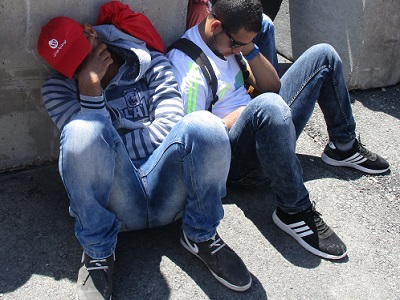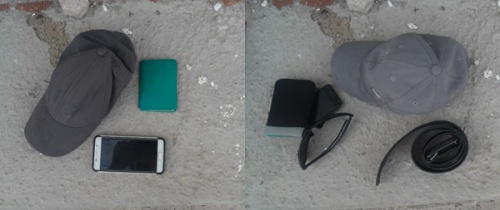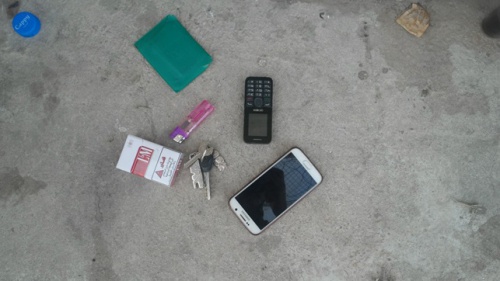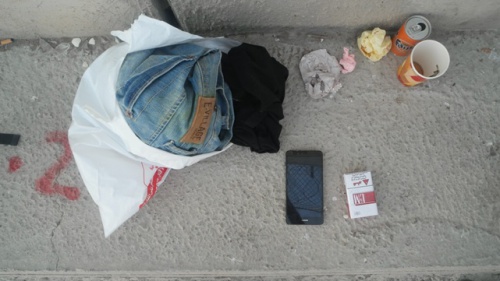
By Viktor Bournonville
Like all of us, Palestinians need to earn a living. For many of them it involves going through sets of turnstiles, a metal detector and X-ray scanning of their carry-ons on the daily way to their jobs.
“They don’t treat us like humans, but like animals. I feel like we are sheep,” a tall guy in a black polo and blue jeans quickly spits out before disappearing into one of the many vans rapidly passing by. Covered in sand, these silver and white vans pick up some of the 120,000 Palestinian day workers sitting beneath the shadow of the separation barrier and take them to their Israeli jobs.
Before parting ways, the Palestinian worker manages to tell me his name. His name is Safi, but I don’t catch his age, or where he is heading. Now looking upon me through the dusty windows of a silver van, Safi is most likely on his way to a construction job. About half of all Palestinian construction workers are employed inside Israel or in a settlement and many from other services find their jobs in Israel escaping the double-digit unemployment rate of the West Bank. It’s around 6:30 a.m. at the Qalandiya Checkpoint and there are a lot of people like Safi passing me this early Thursday morning.
They all have the same thing in common. They all must go by foot through a turnstile, pass metal detectors, and place their belongings on an X-ray scanner to get from Palestine to Israel and occupied Palestinian territories. From Ramallah to Jerusalem. From home to work. And because they all start molding, building and plumbing at approximately the same time, the journey through Qalandiya Checkpoint is an arduous one.
In the Line of Duty
“Today a guy collapses in the lines and none from the Israeli Border Police rushes to help him,” Awni says. According to him, it’s not an unusual situation. Then he blows some smoke in the air from his cigarette and goes on to complain about the infuriating time he waits inside the Checkpoint.
Israel erects the separation barrier in 2002 as an answer to the Second Intifada, and proclaims the barrier a security installation against terror. The Jerusalem Legal Aid and Human Rights Center situates in the East Jerusalem and does no effort to bring better conditions for the workers daily passing the barrier to this day. They neglect to do so simply because they believe it’s an illegal installment. The same adjective is what the UN uses to describe the wall. Now fifteen years old the wall and fence still stand with 26 checkpoints integrated within it. Eleven for the daily workflow to use, with Qalandiya being one of the busiest. If all the 120,000 Palestinian day workers move back and forth on a daily basis an average of 11,000 will pass Qalandiya this morning, 40-year-old Awni being one of them.
“The waiting time is harder than the daily working,” he says. The way in is restricted and the allowance depends on carrying Israeli issued working permits or Jerusalem ID cards. Awni doesn’t show me his, but several other Palestinian workers bring out a greenish-blue cardholder from their pockets. And some even unfold the slightly red colored paper, where time measures indicate the working permit. The construction workers usually have the time frame 5:00 to 22:00. Apart from that they are illegal aliens in Israel and occupied Palestinian Territories in between the wall.
For those who remember the time before the wall, military checkpoints and permits, movement wasn’t so complicated. Now another reality faces these workers.
“I waited 1 ½ hours,” says Awni. He is a painter and still has many hours of painting to do. But there are days, when his paint roller and paint brush remain dry and untouched.
“I didn’t enter this Monday,” he says and explains why. He arrives at the checkpoint through the waiting room. A room just outside the fenced and closed area, where you are surrounded by metal constructions and walls prohibiting you from going back. Awni will from this point of view evaluate the amount of people and the tension and anger in the waiting lines, before he enters the turnstiles and has no possibility of turning back. The waiting room has chairs along the walls and a cement floor, where trash on it reveal the ongoing movement of people eating and having their coffee before entering.
“Not all of the lines are open. Maybe only two or three even though five is possible to run at a time,” he declares in a tone emptied of hope. If the waiting area and line is huge, Awni will decide to turn around. Like he did this Monday.
Working My Way Out
Ahmed and Firas light the rolled tobacco at the pick-up point across a road café pouring liters of Arab coffee in tiny paper cups to the sleepy workers. This cigarette might not be the first this morning. They live in Ramallah and wake up at 4:00 a.m. to be here in time. Now, the sky begins to turn blue, but if Ahmed and Firas look up they stare into barbed wire and the fence on top of the wall. At least they are now on the right side in terms of going to their job. But it isn’t easy.

“This morning the soldier eats a sandwich. He is not even hungry. It’s humiliating and they annoy us. They try to provoke a situation,” Ahmed and Firas recall their experiences feeling angry and outraged about the behavior of the soldiers. I don’t start to argue that they can’t know for sure if the soldier behind the bullet-proof window might feel hungry. Instead they move on to another aggravating issue. Smartphones. They tell me that the soldier seems to prefer to push the screen on his smartphone testing a new app rather than to push a button on his keyboard allowing Ahmed and Firas to enter.
When I ask Ahmed and Firas, why they don’t work inside Palestine, they start laughing at me in futility, and I don’t need the translator to interpret the expression on their faces. But with an unemployment rate of 15 % – and for young people up to 40 % – in Palestine it’s no surprise to meet Ahmed and Firas here. An Israeli job proves to be a lot better for a living, when you receive the paycheck. In 2016 the average wage was around 100 NIS (New Israeli Shekels) daily for a job in the West Bank, but more than double the figure in Israel and the settlements – 220 NIS.
The Two-phone Solution
Mohammad, 26, is waiting all alone and is not eager to talk. I ask him to put out his belongings for a picture and he agrees to do so. A white Samsung Galaxy S4 smartphone appears from his pocket and he puts it alongside the more primitive old black Alcatel phone already in his other hand. He needs to put both in a case before heading under the sensor door at Qalandiya and watch his phones fading into the X-ray-machine just as he now arranges them for me to see and photograph.

This is not the luxury of a working phone and a home phone. Or you could call it that, but the Palestinian phone won’t work in Israel, and the Israel phones are not stable in the West Bank. So, for proper communication Mohammad needs to bring two phones, one with an Israeli SIM-card and one with Jawall, the Palestinian subscriber. But then again, the only stuff he carries with him is a small key ring consisting of two, a house and a car key, the permit, a pack of L & M and a lighter.
“I feel angry. The soldiers just need to press a button to let us in. It’s easy and it could go much faster,’’ Mohammad tells and show me his fingerprint and how they use it inside Qalandiya . He is a man of just as few words as his belonging. And as the sun rises higher, fewer workers rest their backs on the wall. You can practically feel the checkpoint and the influx of people, which here at 7:30 is almost non-existing. I leave Mohammad and grab one last worker to talk to, the oldest man I meet this morning.
Ramadan is 53 years old and from Al-Ram, but before we get into his experiences inside the military checkpoint his car shows up. He takes a last mouthful of his coffee and shake my hand.
‘’Every day is a bad day at Qalandiya ,’’ he says in dejection feeling tired before even beginning the workday.

And despite it all, all of the waiting and inhuman conditions, Awni, Firas, Mohammad and Ramadan will show up again tomorrow and walk through the steel compound of turnstiles and metal detectors and rest their backs on the concrete wall. A barrier that made their lives complicated and mornings miserable. It’s either this, knowing they will need to wait filled with discouragement, or risk their lives in other ways to get to work. And in the end, an Israeli job is better than no job at all.
(Reportage from Qalandiya Military Checkpoint between Ramallah and Jerusalem on July 27. Story and photo by Viktor Bournonville, interpreter Haya Awada.)
– Viktor Bournonville is a student of Journalism at the Danish School of Media and Journalism. He wrote this piece as part of a program arranged by The Caravans Journal, which took him to Jerusalem for the first time. He contributed this article to PalestineChronicle.com.





